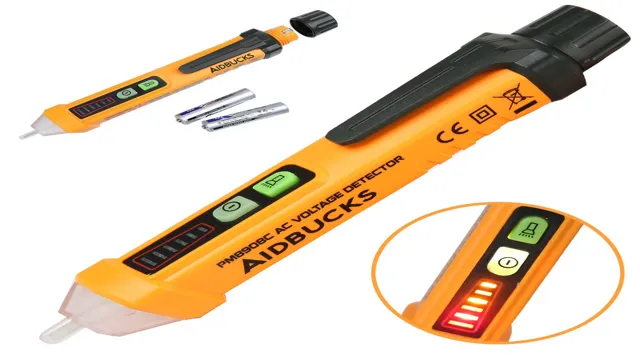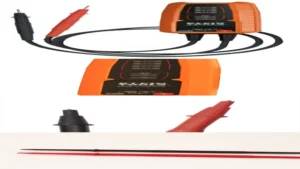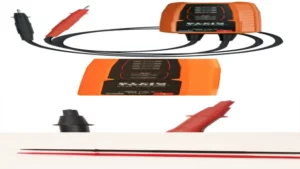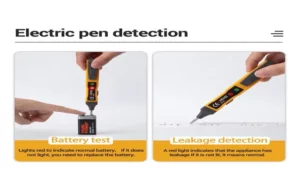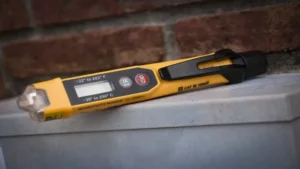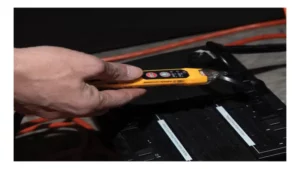Have you ever been in a situation where you needed to test for voltage but didn’t have the right equipment? It can be a stressful experience, especially if you’re dealing with electricity and potential safety hazards. That’s where a non-contact voltage tester comes in handy. This tool is essential for anyone working with electrical systems, whether it’s a professional electrician or a DIY enthusiast.
In this blog post, we’ll dive into why a non-contact voltage tester is so important and how it can help you stay safe while working with electricity. So, buckle up and get ready to learn!
What is a Non-Contact Voltage Tester?
A non-contact voltage tester is a tool that is used to detect the presence of voltage in electrical wires or devices without actually coming into contact with them. This type of tester can be quite useful for a number of different applications, especially when you need to check for the presence of live current in a potentially dangerous environment. When using a non-contact voltage tester, you simply hold the device near the area that you want to test, and if there is any voltage present, the tester will emit an audible or visual signal to let you know.
This makes it easy to quickly and safely check whether an electrical circuit is live or not, without having to touch the wires directly. Non-contact voltage testers are commonly used by electricians, contractors, and homeowners for a variety of tasks, such as testing outlets, light switches, and circuit breakers. So if you’re working with electricity and want to stay safe, it’s definitely worth investing in a non-contact voltage tester.
Overview of how it works
A non-contact voltage tester is a tool used by electricians and DIY enthusiasts to check if a wire or cable is energized without actually touching it. This type of tester works by detecting the electromagnetic field that surrounds an energized wire when there is voltage present. When the tester is held close to the wire or cable, a beep or light will indicate that voltage is present, and the electrician can take necessary precautions before working on the electrical system.
It’s an essential tool for those who work with electricity because it ensures that they are safe while working on the job. With a non-contact voltage tester, electricians can avoid the risks and dangers of accidental electrocution that can occur when working with live wires. So, if you are working on an electrical project, make sure to grab a non-contact voltage tester before you begin, to ensure your safety.
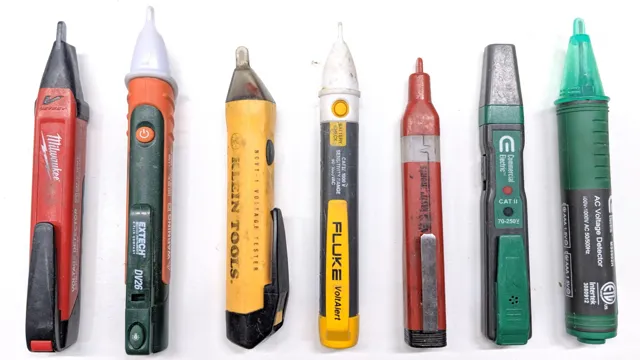
Different types and their uses
A Non-Contact Voltage Tester is a device that detects an electrical field without the need for physical contact. It is often used by electricians and DIY enthusiasts to check for the presence of live wires or circuits before working on them. The tool is equipped with an antenna that detects the electric field around the conductor, and a visual or auditory indicator that alerts the user to the presence of electricity.
The device is easy to use and poses no danger to the user as it does not require direct contact with the electrical source. Whether you’re a professional electrician or simply looking to do some home repairs, a Non-Contact Voltage Tester is an essential tool that can help keep you safe while working with electricity. So, next time you’re working on an electrical project, be sure to add this handy tool to your toolkit!
Why use a Non-Contact Voltage Tester?
If you’re an electrician or a DIY-enthusiast, using a non-contact voltage tester could be a game-changing tool in your work kit. These nifty tools are designed to detect electrical fields surrounding wires, outlets, and circuit breakers without making direct contact. Instead, these testers rely on capacitive coupling to safely detect voltage.
Using a non-contact voltage tester significantly reduces the risk of electrical shock, making it a safer choice than traditional contact testers. In addition, they are easy to use, portable, and can detect live wires even in cluttered wiring environments. Using a non-contact voltage tester can also save you time and effort when troubleshooting because it helps pinpoint the source of electrical issues quickly.
Overall, investing in a non-contact voltage tester can be a smart choice that simplifies your work and enhances your safety, so why not give it a try?
Safety reasons
Using a non-contact voltage tester is essential for safety reasons. These testers are designed to detect the presence of electric currents without having to make direct contact with the wires or circuits, which significantly reduces the risk of electric shock. Non-contact voltage testers are a handy tool for anyone who works with electrical wires or appliances, such as electricians, HVAC technicians, and DIY enthusiasts.
They are easy to use and can quickly identify live wires so that you can avoid them. Without a non-contact voltage tester, accidental electrocutions can occur, leading to serious injuries and sometimes, even fatalities. Therefore, it is crucial to use a non-contact voltage tester before working on electrical systems or circuits to ensure the safety of you and your loved ones.
Remember, safety should always be the top priority when working with electricity.
Accurate and efficient testing
Non-Contact Voltage Tester When it comes to electrical work, safety should always be a top priority. This is where a Non-Contact Voltage Tester comes in handy. This device allows you to detect voltage without having to make physical contact with the electrical current.
This can help prevent potential accidents and injuries. Non-Contact Voltage Testers are also efficient, allowing you to quickly and accurately test for voltage. They are especially useful in difficult-to-reach or tight spaces where physical contact may be unsafe or impossible.
By using a Non-Contact Voltage Tester, you can ensure a safer and more efficient electrical work environment. So, if you want to improve your testing accuracy and safety, consider investing in a Non-Contact Voltage Tester for your electrical tasks.
Time-saving benefits
A non-contact voltage tester can save you a significant amount of time and hassle when working on electrical systems. This tool allows you to quickly and easily detect the presence of live electrical current without having to physically touch the wiring or components. By simply holding the tester near the wire or outlet, you can determine if it is safe to touch or work on.
This eliminates the need for time-consuming and potentially dangerous trial and error methods. Additionally, non-contact voltage testers are portable and easy to use, making them ideal for both professional electricians and DIY enthusiasts. So, if you want to save time and work more efficiently on your electrical projects, consider investing in a non-contact voltage tester.
It could make all the difference for your safety and productivity.
Choosing a Non-Contact Voltage Tester
When it comes to electrical work, safety is key. That’s why a non-contact voltage tester is an essential tool for any electrician or DIYer. But with so many options on the market, how do you choose the right one? One important factor is the voltage range.
Make sure to choose a tester with a range that matches the voltage of the system you’re working on. You should also consider features like audible and visual alerts, which will help you quickly identify the presence of voltage. Another important factor is durability.
Look for testers made with high-quality materials that will withstand wear and tear. And finally, think about the size and shape of the tester. A compact, ergonomic design will make it easier to use in tight spaces.
Ultimately, the right non-contact voltage tester will provide peace of mind and help keep you safe while working with electricity.
Factors to consider
When it comes to choosing a non-contact voltage tester, there are several factors that you should consider to ensure you make the right choice. One important factor is accuracy. You want a tester with a high degree of accuracy, as this will enable you to make safe and informed decisions when working with electrical equipment.
Additionally, you should look for a tester that is easy to use and offers clear readings. A tester that is difficult to read or use can lead to errors and potentially dangerous situations. Another important factor to consider is the range of the tester.
You want a tester that can detect voltage at a safe distance, allowing you to work safely and avoid unnecessary exposure to electrical currents. Finally, durability is key. You want a tester that can withstand the wear and tear of regular use and will last you for years to come.
By considering these factors, you can select a non-contact voltage tester that meets your needs and helps keep you safe while working with electricity.
Popular brands and their features
When it comes to choosing a non-contact voltage tester, there are many popular brands with various features available in the market. The most important factor to consider is safety, and for that, brands such as Fluke and Klein Tools are highly recommended. Fluke voltage testers have a high and low voltage setting, ensuring that you won’t miss any voltage fluctuations.
Furthermore, they come with a built-in flashlight, making it easier to work in low-light environments. On the other hand, Klein Tools voltage tester is designed with an auto-shutoff feature, which automatically turns off after five minutes of inactivity, saving battery and preventing accidental discharge. Additionally, some brands offer multiple functions in one tool, such as the Greenlee non-contact voltage tester that also functions as a GFCI outlet tester.
Overall, it’s essential to choose a reliable and durable brand, so you can work with confidence and precision.
Conclusion
In conclusion, owning a non-contact voltage tester is like having a sixth sense for electrical safety. It allows you to detect potential hazards without even coming into direct contact with any wires or circuits. It’s like having a superhero power that lets you zap potential danger before it can harm you.
So, if you want to be a safety-minded hero in your home or workplace, get yourself a non-contact voltage tester and stay shock-free!”
FAQs
What is a non-contact voltage tester used for?
A non-contact voltage tester is used to detect the presence of an electric field without physically contacting the wire or electrical device.
How does a non-contact voltage tester work?
A non-contact voltage tester works by using a sensor to detect the electric field around a wire or electrical device. When the tester is brought near a live wire, it will emit an audible or visual signal to indicate the presence of voltage.
Are non-contact voltage testers safe to use?
Yes, non-contact voltage testers are safe to use since they do not require physical contact with the electrical source.
Can a non-contact voltage tester be used on any type of electrical device?
No, a non-contact voltage tester should only be used on devices with AC voltage. It cannot be used to detect DC voltage.
How accurate are non-contact voltage testers?
Non-contact voltage testers are generally accurate but may have limitations depending on the specific model and environmental factors such as strong electromagnetic fields or interference.
What are the benefits of using a non-contact voltage tester over a contact tester?
Non-contact voltage testers are safer to use, faster, and more convenient since they do not require physical contact with the electrical source.
Can non-contact voltage testers detect low voltage levels?
It depends on the sensitivity of the tester. Some non-contact voltage testers are designed to detect low voltage levels, while others may only detect higher voltage levels. It is important to choose the right tester for the specific application.
